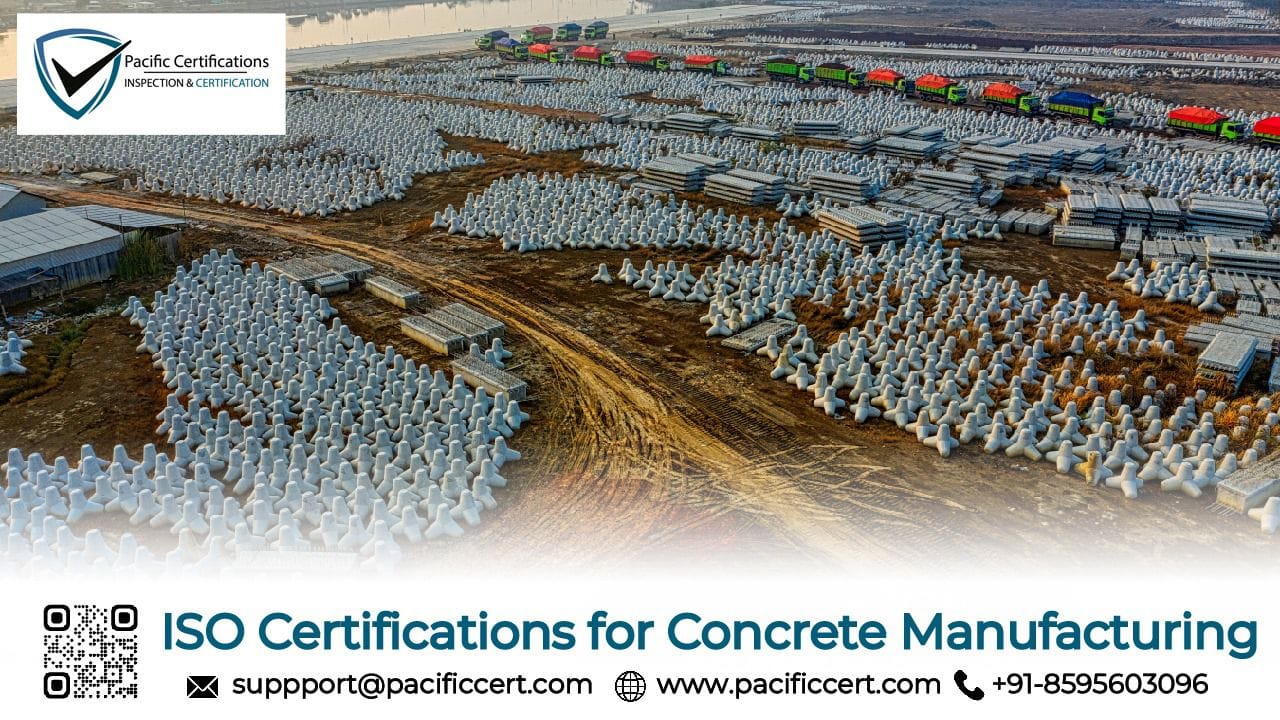Introduction to ISO Certifications for Concrete Manufacturing Businesses

Quick Summary
"Manufacturers of concrete products rely on consistency, safety, and environmental responsibility, all of which ISO certifications help ensure. Standards such as ISO 9001 strengthen quality management and process reliability; ISO 14001 promotes eco-conscious practices by managing waste and emissions; and ISO 45001 prioritizes worker health and safety in industrial settings. Securing certification involves documenting policies, conducting internal audits, and completing independent assessments. The outcome includes improved product uniformity, stronger regulatory compliance, operational efficiency, and increased market credibility—critical in construction-driven sectors demanding durability and standardised practices. "
What is ISO Certification?
ISO certification represents adherence to standards set by the International Organization for Standardization (ISO). This certification ensures that companies operate according to international best practices in areas such as quality, environmental management, and occupational health and safety.
ISO certifications are essential for concrete manufacturers looking to enhance product quality & safety. In the competitive landscape of concrete manufacturing, standards like ISO 9001, ISO 14001, and ISO 45001 set benchmarks for quality, environmental responsibility, and worker safety.
For businesses aiming to differentiate themselves and meet regulatory expectations, understanding and adopting these certifications is a crucial step.
For concrete manufacturers, ISO certification not only verifies quality but also demonstrates a commitment to sustainable and safe practices.
Key ISO Standards for Concrete Manufacturing
Concrete manufacturing involves various processes that can benefit from ISO standards:
- ISO 9001: Focuses on quality management and improving operational efficiency.
- ISO 14001: Addresses environmental impacts and promotes sustainable practices.
- ISO 45001: Emphasizes workplace safety and health management.
- ISO 50001: Guides energy management to improve efficiency and reduce energy costs.
- ISO 10002: Provides a framework for customer satisfaction and complaint management.
Together, these standards help concrete manufacturers build trust with clients and streamline their production processes.
Requirements for ISO 9001 in Concrete Manufacturing
To achieve ISO 9001 certification, concrete manufacturers must establish a Quality Management System (QMS) that includes:
- Leadership Commitment: Senior management must be involved in defining and supporting quality objectives.
- Customer Focus: Processes should be designed to enhance customer satisfaction by meeting or exceeding expectations.
- Process Approach: Define and manage processes and interactions within the organization to improve efficiency.
- Risk-Based Thinking: Identify and address risks that could impact quality and continuity.
- Continuous Improvement: Regularly review and refine quality objectives, corrective actions, and preventive measures.
- Employee Training and Competency: Ensure employees have the necessary skills and knowledge to perform their roles effectively.
- Documented Information: Maintain documentation, including records of process performance, quality objectives, and customer feedback.
Requirements for ISO 14001 in Environmental Management
ISO 14001 helps concrete manufacturers address their environmental impact. Requirements include:
- Environmental Policy: Develop and communicate an environmental policy that reflects the company’s commitment to sustainability.
- Environmental Impact Assessment: Identify environmental aspects and assess their impact.
- Legal Compliance: Comply with relevant environmental laws and regulations.
- Objectives and Targets: Set measurable objectives to reduce environmental impact.
- Resource Management: Optimize the use of natural resources and manage waste effectively.
- Operational Control: Implement controls for environmental aspects, including emissions, waste, and energy consumption.
- Emergency Preparedness: Develop a plan to address environmental emergencies.
Requirements for ISO 45001 in Worker Safety
ISO 45001 focuses on occupational health and safety (OHS) requirements, which include:
- Health and Safety Policy: Create a policy that defines the organization’s commitment to workplace safety.
- Risk Assessment: Identify workplace hazards, assess associated risks, and establish control measures.
- Legal Compliance: Ensure compliance with relevant occupational health and safety legislation.
- Roles and Responsibilities: Assign OHS roles to ensure accountability.
- Training and Awareness: Train employees on safety practices and provide resources for safety education.
- Monitoring and Measurement: Track safety performance indicators and take corrective action as needed.
- Incident Management: Establish procedures for reporting and investigating workplace incidents.
Requirements for ISO 50001 in Energy Management
ISO 50001 supports energy efficiency and conservation. Requirements include:
- Energy Policy: Develop a policy that outlines the organization’s commitment to efficient energy use.
- Energy Review: Conduct an initial review to assess energy consumption and identify areas for improvement.
- Baseline and Objectives: Set an energy baseline and objectives based on energy needs and consumption patterns.
- Energy Management Team: Designate a team to oversee energy management initiatives.
- Monitoring and Measurement: Track energy usage and performance metrics to evaluate progress.
- Operational Controls: Implement controls and procedures to manage significant energy-consuming processes.
- Continuous Improvement: Review energy performance regularly and take corrective action as necessary.
Requirements for ISO 10002 in Customer Satisfaction
ISO 10002 provides guidance on handling customer complaints and feedback. Requirements include:
- Complaint Management Policy: Create a policy to ensure complaints are managed efficiently.
- Complaint Handling Procedures: Develop standardized procedures for receiving, logging, and resolving complaints.
- Customer Feedback: Establish channels for obtaining customer feedback on products and services.
- Employee Training: Train employees in handling complaints effectively and professionally.
- Complaint Resolution: Implement procedures to resolve complaints in a timely manner.
- Continuous Improvement: Use complaints as a tool to identify areas for improvement and prevent recurring issues.
- Documentation: Record and maintain complaint records, resolutions, and actions taken.
Benefits of ISO Certifications for Concrete Manufacturers
ISO certifications provide concrete manufacturers with multiple benefits:
- Efficiency: Streamlined processes lead to cost savings and reduced downtime.
- Certifications position companies as industry leaders.
- Compliance: Meeting ISO standards helps with regulatory compliance and risk mitigation.
- Customer trust: Certifications assure clients of consistent quality and safety.
- Sustainability: Certifications like ISO 14001 and ISO 50001 promote environmentally friendly practices.
Steps to Obtain ISO Certification in Concrete Manufacturing
Obtaining ISO certification involves a structured approach:
- Initial assessment: Determine current practices and identify gaps.
- System development: Establish procedures and documentation to meet ISO requirements.
- Training and implementation: Ensure staff understand and adhere to the new processes.
- Audit: Conduct an internal audit to verify compliance before the external audit.
- Certification: Undergo the final audit from an accredited certification body.
Documentation Requirements for ISO Certification
Documentation is a critical part of the ISO certification process, covering quality policies, safety guidelines, environmental impact assessments, and employee training records. These documents provide evidence of compliance and support continuous improvement efforts.
Implementing Quality Management Systems in Concrete Production
To achieve consistent quality, concrete manufacturers need to establish robust quality management systems (QMS). A QMS involves systematic processes that cover every stage of production, from raw material sourcing to final product testing. Companies should use tools such as Six Sigma and Lean methodologies to optimize processes and minimize defects.
Common Challenges in Achieving ISO Certification for Concrete
Achieving ISO certification can be challenging due to:
- Complex regulatory landscapes
- High initial costs
- Time constraints for implementation
To overcome these obstacles, companies may benefit from internal audits, employee training, and management support.
Costs Associated with ISO Certifications for Concrete Manufacturers
ISO certification costs vary based on factors such as company size, existing processes, and the level of certification required. Costs typically include:
- Consultation and documentation: Developing processes and systems.
- Training: Equipping employees with knowledge of new protocols.
- Audit fees: Covering both internal and external audits.
Companies can optimize expenses by focusing on efficiency improvements and leveraging existing resources.
ISO Certification and Industry Compliance
ISO certification aligns with many national and international regulations, helping concrete manufacturers stay compliant with industry standards. By adopting ISO-certified processes, companies can reduce legal risks and demonstrate accountability to stakeholders.
Conclusion
As sustainability and innovation reshape industries, ISO certifications will continue to evolve, addressing emerging challenges in environmental impact, resource management, and safety. Future standards may include advancements in technology integration and circular economy practices in concrete manufacturing.
In conclusion, ISO certifications play a pivotal role in ensuring quality and sustainability in concrete manufacturing. By implementing standards like ISO 9001, ISO 14001, ISO 45001, ISO 50001, and ISO 10002, concrete manufacturers can boost efficiency, reduce environmental impact, and improve worker safety.
As the industry moves forward, these certifications will remain essential for concrete companies committed to excellence and compliance.
Ready to get ISO certified?
Contact Pacific Certifications to begin your certification journey today!
Suggested Certifications –
Read more: Pacific Blogs

